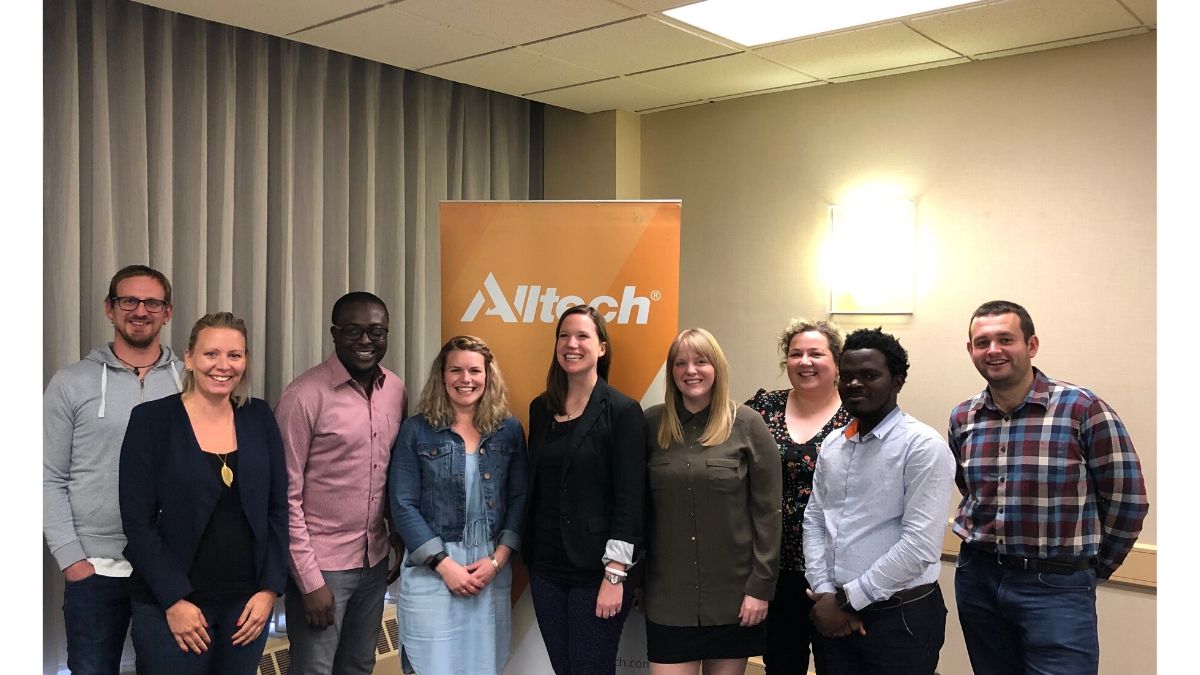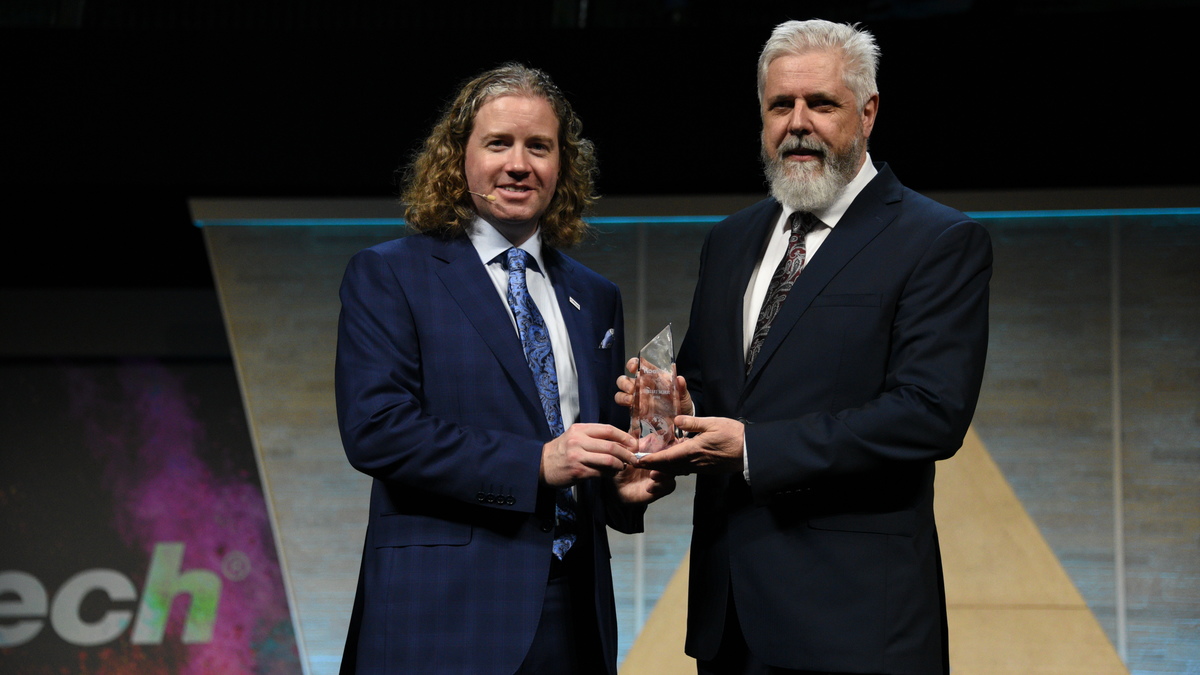Dr. Ronan Power – Insulin innovation: A revolution in the treatment of diabetes
The rise of insulin prices over the last decade, plus the cost of pumps and syringes, has made treatment for diabetes more expensive than ever. Will a cost-effective insulin replacement ever exist? Dr. Ronan Power discusses Alltech Life Science's breakthrough in insulin pills for diabetes.
The following is an edited transcript of Tom Martin’s interview with Dr. Ronan Power. Click below to hear the full audio.
Tom: Insulin prices have more than tripled in the last decade, and because insulin cannot be taken orally, pumps and syringes can add significantly to the cost. The result? This treatment is quickly becoming unaffordable for many diabetics, but insulin therapy is critical for most of them, and there's a search for options. One might have been found.
Dr. Ronan Power, vice president of Alltech's Life Sciences division, joins us to talk about something of a revolution in the treatment of diabetes. Thanks for joining us, Dr. Power.
Ronan: Thank you, Tom.
Tom: Tell us why, first of all, there is this need. I kind of described it in the introduction, but diabetes is a huge problem in this country, I assume.
Ronan: Absolutely. It's a huge problem not only in the Western world, but it's becoming more and more of a problem in countries that have, if you like, found affluence in the last two to three decades and are adopting more and more of a Western-style diet and lifestyle. It's becoming a really, really big problem. I think one of the figures I saw most recently was an estimated 360 million sufferers worldwide, but that's only diagnosed cases.
Of the subtypes of diabetes, the two main ones, of course, people will be familiar with are Type 1 and Type 2. Type 1 typically hits younger people, and that is a type of diabetes where the cells in the pancreas that produce insulin are destroyed, and that can be an autoimmune-type disease or a reaction to a virus, in some cases. The most prevalent form is Type 2, which used to be called “adult-onset diabetes,” but now, it's creeping downwards in the age group and it's hitting people as young as four years of age — even younger — and that's part of the associated obesity epidemic or pandemic that we see in the world today.
Tom: We're seeing studies that are projecting that if these rates, these obesity rates, continue at current trends, more than half the population of almost 40 states in the United States will be obese in 2030. What are the implications of failing to stop and reverse that trend?
Ronan: I think they're absolutely massive — and I would say 50% is a conservative estimate. If you look at the implications of obesity as they relate to diseases like diabetes, there is a condition known as metabolic syndrome that precedes the development of diabetes. This is a condition which is characterized by not just obesity, but high blood pressure, high cholesterol or dyslipidemia. That's abnormal blood profiles, high triglycerides and so on and so forth. That can predispose people to many, many diseases, particularly coronary vascular disease or cardiovascular disease and pulmonary disease. That's even before you hit any diabetes threshold. Once people develop diabetes, there's a whole range of attendant problems that come with that, as people are aware of, but one of the larger problems, in my opinion, is the state of insulin resistance that begins to develop in people who tend to be overweight or have a higher-than-normal body mass.
Insulin resistance in itself can cause huge problems. Let me just mention an example. One of them is called PCOS, or polycystic ovary or ovarian syndrome. That's becoming a huge problem in the female population in terms of reduced fertility, inability to conceive and inability to sustain a pregnancy. That's a direct implication of insulin resistance. So, we're not just talking diabetes here; we're talking much broader, more debilitating conditions of life, if you will.
Tom: We're here to talk about something that you're working on, which is an alternative to insulin that you have in development now. Can you tell us about this?
Ronan: Sure. This is, I guess, the culmination of about 12 years of work in our labs here at Alltech. This started off as a plant-based or a botanical-based compound we found which was able to increase energy production in cells, or seemingly increase energy production in cells. Actually, it turned out to be that it improved energy consumption. So we've been studying this for quite some time, and we actually have made a lot of variance of this particular compound. We isolated it. We synthesized it. We made variations on a theme, as it were. Today, we have a compound, which we call Compound 43 — obviously a very imaginative name, the number 43, the variation of the compound which we developed. So, Compound 43 has got a very unique ability in being able to bind to insulin receptors and activate that receptor in the absence of insulin.
In effect, if you want to view the action of insulin on a cell as a lock and key mechanism, imagine that insulin is the key. It fits into a lock, which we shall call the insulin receptor. When both lock and key are working correctly and the mechanism is turned appropriately, that opens a glucose channel and allows glucose to enter the cell and be used properly.
Tom: Let me make sure I understand up to this point. The compound that you're working on replaces that key.
Ronan: It replaces the key. It can activate the lock even when the lock is broken, because in Type 1 diabetes, you're missing the key. In Type 2, there's something wrong with the lock mechanism; it doesn't work properly, or not at all, in some cases. But what this compound does is it binds to the insulin receptor (i.e., the lock) and can open it.
Tom: So, it's doing the work of the insulin.
Ronan: It's doing the work of the insulin. What we have, in effect, is an insulin replacement. It doesn't bind to the insulin receptor in the same place as insulin. It binds at different locations. Its purpose, simply, or what it does, is it brings the two arms of the insulin receptor together, and once they join together, it activates the insulin cascade inside the cell, which then allows that glucose door to open and allow glucose in.
Now, it's not a runaway reaction, by any means. It does stop, so there is a finite half-life of this compound, which we've determined to be about eight to ten hours. It doesn't crash the blood glucose. It takes it down, but it doesn't bottom it out at a dangerous level.
Tom: Now, as I understand it, this would be administered orally as opposed to a shot.
Ronan: Absolutely. This is our big breakthrough in the last year. When we initially tested this compound, we were using it in the traditional insulin-type way, of a subcutaneous injection, or even an IP, an intraperitoneal injection, but we've now developed a formulation which can be taken orally in tablet form, pill form, which works very well indeed. We have actually tested that in mouse models of diabetes, several different mouse models of diabetes, and it works perfectly well. The compound itself, we've also tested in human cell lines — liver, skeletal muscle, all of the major organs that are impacted by diabetes — and find that it works beautifully.
It can even be used in concert with insulin, in some cases, because when I describe the Type 1 and Type 2 diabetes, especially for Type 2, there are various levels of it. For some people, insulin works, but not as well as it does in the normal case. That's what we term “insulin resistance.” Insulin resistance can be a graded or a gradated type of resistance. That's why some diabetics, Type 2 diabetics, still take insulin, but this can actually help insulin action, so it works in concert with insulin, in some cases. Because it doesn't share the same binding site, it can be an additive or synergistic effect.
Tom: I'm sure that anybody who is suffering from diabetes and hears this is going to be quite excited and quite hopeful.
Ronan: Yes.
Tom: How should they temper that hope? How far off are you, do you believe, from going to market with this?
Ronan: First of all, I wouldn't be sitting here if I didn't believe this was a breakthrough. I believe that we can get this out through what we call a phase-one clinical trial in humans within about three years. If it shows promise there, we hope to go right ahead and follow with phase two or three. Best-case scenario, Tom: we're probably looking at six years to market, but I think that's a fast track. That will be a fast track, but I'm hopeful that when we approach FDA with this, they may, in fact, look upon it and say, “Okay.” This type of compound is not unknown, so it has a pretty good historical safety profile.
I believe that there is an urgent need to come up with alternatives to insulin. For whatever reason, Tom, there is some egregious price gouging going on in that market, and people are dying as a result, and I'm not being overdramatic in saying that. You can look at the press, the news, a whole variety of states, and see that people are actually rationing their insulin, using less-effective forms. People have to decide between groceries and insulin, and in some cases, it costs people more than their monthly mortgage, so it's a desperate situation for something that was sold — the patent for this — a lot of people aren't aware that the patent for insulin was sold in 1923 to the University of Toronto for the princely sum of CAN$3.
Tom: And I understand, now, that a vial of insulin can be manufactured for about $7.
Ronan: Yes, it is, depending on the grade and the type. It can vary from a very low price like that up to — I'm not sure of the final cost, but certainly, I would guess, no more than $20 or $30, but it's selling for people without insurance — I hear horror stories of people paying $400 to $500 a vial for the material, and that's something that, when you open it, you have to refrigerate it, and it's active for 28 days. What we're looking at is a tablet or a pill, and it's stable for two to three years.
Tom: I believe I heard you say that a dose, let's put it that way, would last eight hours or so.
Ronan: Yes.
Tom: So, theoretically, a person could take two of these pills a day.
Ronan: Theoretically, yes. Yes. It will vary per individual. And obviously, that would have to be determined medically by a person's physician, but I would think that, under normal circumstances, two pills per day, based on our studies, our modeling so far.
Tom: When you think beyond FDA approval and marketing and use, Ronan, what do you see out there as the implications for how this impacts the quality of life of diabetes patients?
Ronan: Well, if you look upon it this way, you'll see people in public and in restaurants looking at their little glucose pumps. You know, people still, every morning, come along and take that pinprick on their finger and look at the glucose strip and so forth. So, there’s a whole lifestyle associated with living with diabetes. Probably the biggest drawback I see for people is, you know, having to use all of the paraphernalia — the syringes, the needles, the phobia about the needle itself, even though, nowadays, it's tiny. Very thin needle indeed. But there’s so much that goes along with using insulin. I mean, having to refrigerate it, which is no problem in the West, but think about countries where refrigeration is not an option. Think about Africa.
Tom: Oh, it can limit your mobility too.
Ronan: Of course. Of course it can. And you know, we've done our stability testing on this. I mean, some of the models we use are mice. And can you imagine — we can put this compound into a mouse diet, right? Into a laboratory mouse diet, and retrieve it, fully active, 1 year later. We can pull it back out. So, it's an extremely stable compound.
Now, insulin is basically a protein, so it will degrade. And that's why you have to refrigerate it, and it loses potency after a very limited period indeed. I think 28 days is the expiration on it. So, there are huge benefits for something like this, and indeed, companies have been struggling to develop an oral insulin preparation for decades, but I don't think anybody has ever looked at an alternative to actually physically activating the receptor.
Tom: Since this compound is being designed to treat a disease, I assume it would have to be approved and marketed as a pharmaceutical.
Ronan: Oh, absolutely, yes.
Tom: And that has implications for the company.
Ronan: Uh-huh. Yes.
Tom: Tell us about the discussions around that topic, because I know it's a very complicated one.
Ronan: Oh, it is. It's certainly a departure for Alltech. We have always been — well, apart from our beverage division and crop science — we've been very much associated with animal feed supplements and health supplements for animals. So, our dealings with regulatory bodies have been with the European Food Safety Authority in Europe (and) the Center for Veterinary Medicine branch of the FDA here, which deals with all of the ag products, if you will. We've had little or no dealings with the FDA itself, even though we did have initial discussions with them concerning a supplement we have called AT-001 some years back. But I think that while it will be a departure, it's an exciting new horizon for the company to actually get into something. We launched Alltech Life Sciences for that very purpose probably 8 or 9 years ago, to try to transfer some of our technology and products from the animal health arena to the human health area.
Tom: And it does seem to complement an announcement made at (ONE: The Alltech Ideas Conference) about the establishment of an Alltech foundation in partnership with UK Healthcare, which, of course, is human-oriented.
Ronan: Yes. Yes. I think that's an exciting prospect also. There are many, many excellent researchers and research laboratories at (the University of Kentucky), as you know. And many of those are active in the diabetes area, and I look forward very much to perhaps collaborating with them in the future. This may just be the first of many such preparations that we develop.
We have other products in the pipeline, some of them related to diabetes. And as you know, we're also interested in neurodegenerative diseases. And we're also interested very much in intestinal health for humans. And by that, I mean, you know, trying to prevent this condition that is becoming quite pervasive in the U.S. and, indeed, in the West, which is sparked by what's called — I guess, rather unsavorily — leaky gut syndrome. So, that leads, in turn, to a nonalcoholic fatty liver disease, and that's a condition that afflicts perhaps 20% of the adult population in the U.S., to varying degrees. So, that’s the third area: digestive health. So, neurodegenerative health, digestive health and, also, the diabetic care or, if you like, metabolic health. That will be our three areas of focus.
Tom: Well, I know that you’re a consummate professional, but I also have to believe that, on a personal level, that this accomplishment feels like a pretty good achievement for you.
Ronan: It has been a long road. I have been very, very fortunate, Tom, in having some excellent colleagues working with me, many of whom have what I call “green fingers” in the laboratory — excellent scientists. Dr. ZJ Lan is one. I have two very good ladies working in the lab, Katie Eastridge and Hayley Kincaid. I’ve got Dr. Rijin Xiao, who works on the bioinformatics side of things, all the data collation. And Ryan Goettl is a young man who’s also working on bioinformatics. We’re all held in check and held together by Ms. Jeannie Francis, who herds us wherever we need to go, but I’ve been very fortunate, and our outside collaborations have also been excellent. It’s 12 years. It seems like a long road, but it has gone in a flash. So, it has —
Tom: As these things have a way of doing.
Ronan: Indeed.
Tom: Well, Ronan, good luck with this. Congratulations as well. And we will be anxious to follow your progress.
Ronan: I look forward to updating you as we go along, Tom. Thank you very much.
Tom: Dr. Ronan Power, vice president of Alltech’s Life Sciences division, we thank you very much.
Dr. Ronan Power spoke at ONE: The Alltech Ideas Conference (ONE). Click here to learn about ONE and how you can access innovation on demand.
- Read more about Dr. Ronan Power – Insulin innovation: A revolution in the treatment of diabetes
- Log in to post comments

Because of the increase in people diagnosed with diabetes and the rise of prices for treatment, there is an urgent need to come up with alternatives to insulin.




















